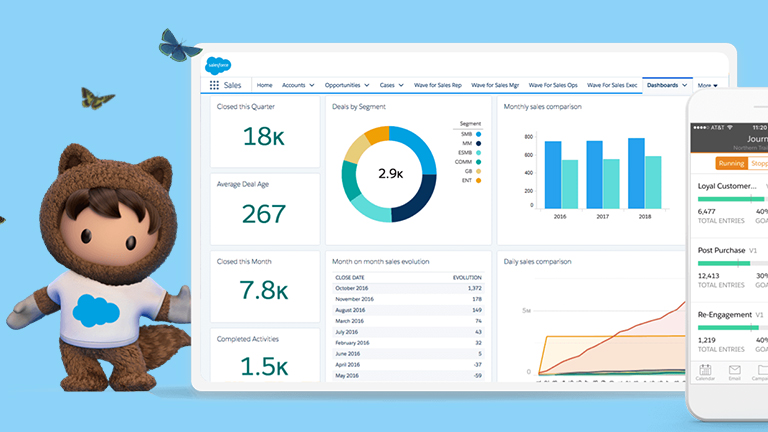In the constantly evolving business landscape, the adoption of effective technologies is crucial to optimising processes and boosting growth. In this context, Customer Relationship Management (CRM) plays a key role, and the solution offered by Salesforce stands out as one of the main options.
The added value of implementing Salesforce CRM
- Centralisation of data and information: One of the main advantages of Salesforce CRM is the ability to centralise customer-related data and information. What Salesforce calls a “360º View” allows quick and efficient access to historical interactions, preferences and needs, empowering employees to offer personalised and more targeted service.
- Process Automation: Salesforce offers a suite of automation tools to simplify repetitive tasks and improve operational efficiency. Automated workflows, alerts and reminders help avoid human error and ensure that no opportunity is missed.
- Sales and Opportunity Management: Salesforce CRM provides a clear view of sales opportunities at all stages of the funnel, allowing the sales team to prioritise efforts and make informed decisions. Forecasting functionalities also help to identify trends and set realistic targets.
Difficulties in Implementation and the Need for Dedication
- Complexity of Customisation: Although Salesforce offers an impressive range of functionalities, customising the platform to meet a company’s specific needs can be a complex process. It is essential to clearly define the requirements and ensure that the configuration is aligned with internal processes.
- Change management: Implementing CRM involves a change in work routines and the tools used by teams. Resistance to change can be a barrier, making an effective communication strategy and adequate employee training essential.
- Integration with Existing Systems: Many companies already have systems in place. Integrating Salesforce CRM with these systems is crucial to ensuring a smooth and consistent experience for users.
The Dedication that Leads to Success
Successful implementation of Salesforce CRM requires dedication on several fronts:
- Careful Planning: Defining clear objectives, mapping processes and identifying specific needs is the first step towards effective planning.
- Team Involvement: The support and involvement of the teams that will be using the CRM is fundamental. Listening to their concerns and needs helps ensure acceptance and adherence to the system.
- Comprehensive Training: Investing in comprehensive training for employees is essential to ensure effective use of the platform and minimise resistance.
Monitoring and Continuous Improvement: After implementation, it is crucial to monitor the use and performance of the CRM. By analysing the results, continuous improvements can be made to optimise processes and maximise benefits.
Conclusion
Implementing Salesforce CRM offers numerous advantages, from data centralisation to process automation and sales management. However, the inherent difficulties and dedication required should not be underestimated. By approaching the challenges with careful planning, adequate training and ongoing commitment, companies can reap the full benefits of this powerful tool, driving long-term success.



